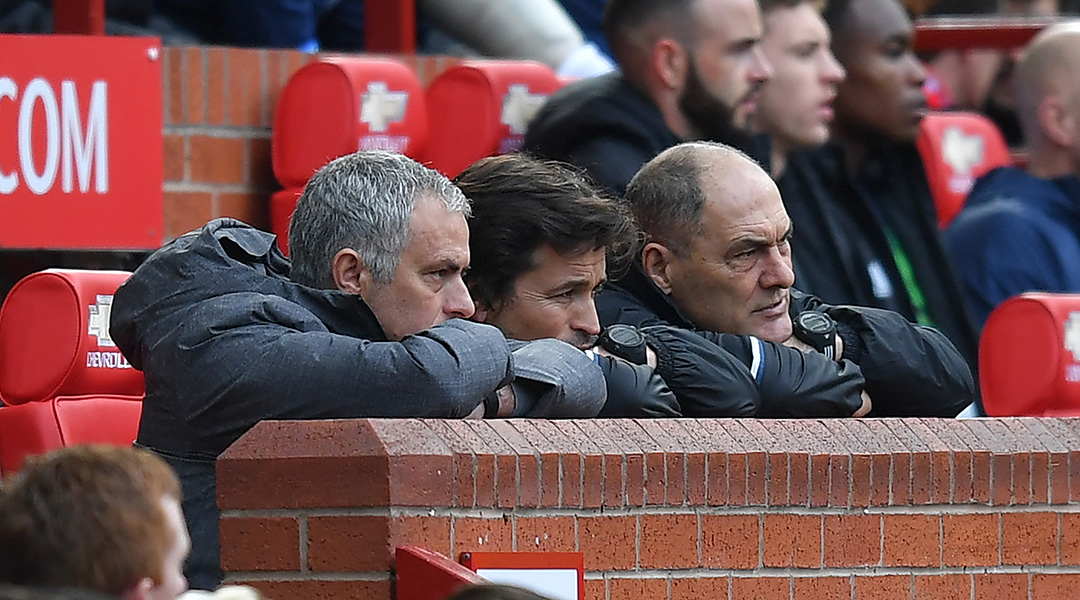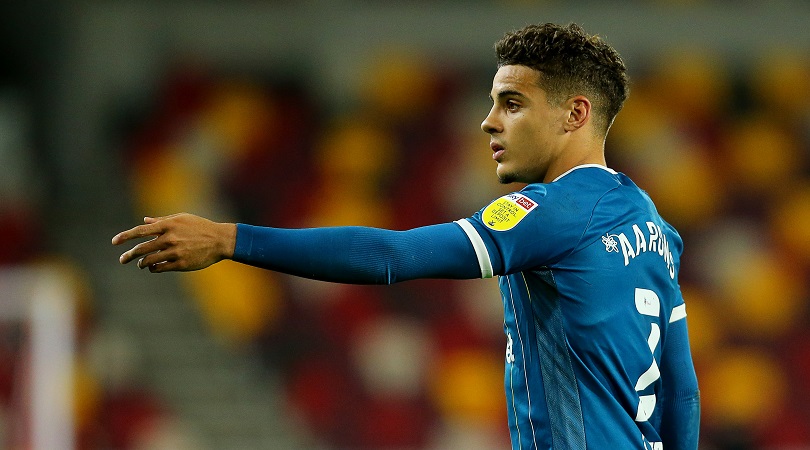Manchester United remain a puzzle that's only getting harder to solve
Seb Stafford-Bloor was at Old Trafford to watch a confused Manchester United stumble against Everton
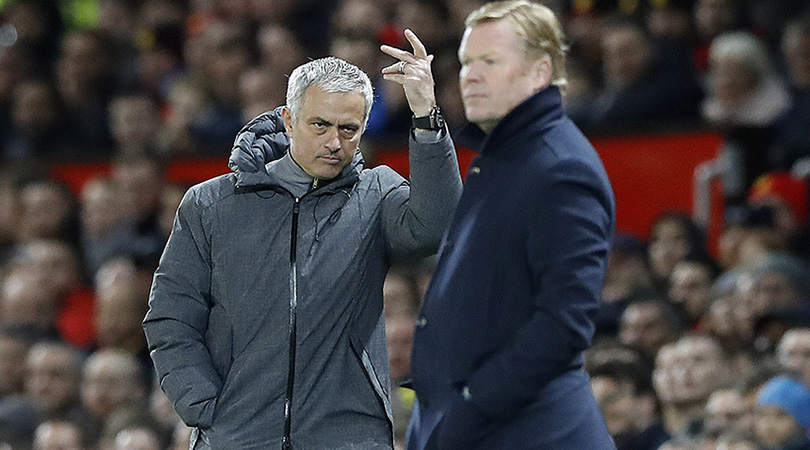
Jose Mourinho was still seething. Antagonised by a benign BBC interview after the draw with West Brom, his frustration leaked into his programme notes ahead of the midweek game with Everton. Manchester United must score the first goal in, he insisted, particularly against teams who “come to Old Trafford without aiming to cross the halfway line”.
Close your eyes and you can hear the feint sound of Tony Pulis’s Severn Bridge chuckle.
The trouble for Mourinho is that with the opportunity of managing United comes an intolerance for excuses. The Portuguese has placed great emphasis on his side’s chance-creation statistics this season but, while not technically wrong, that’s not something of any great significance. Look around Old Trafford and you see why: the stadium is decorated with banners which celebrate the club’s decadently successful past and there’s no room here for could haves or should haves.
An adjustment period?
Maybe that’s something Mourinho still has to come to terms with. United are perhaps the most binary club in the country and the place where his obfuscation counts for the least.
While his fundamentalists have drawn attention to the long, unbeaten Premier League record at his new club (20 games now), the more lucid majority have looked on with blank expressions, seen old and new rivals disappear into the distance, and wondered aloud why all this - the superstar manager and the glittering boutique of players - isn’t adding up to more. They see the missed chances and the strong goalkeeping performances; they even hear the rattle of the woodwork. The difference, though, is that they see those as symptoms of failure rather than, as Mourinho would have it, an asterisk.
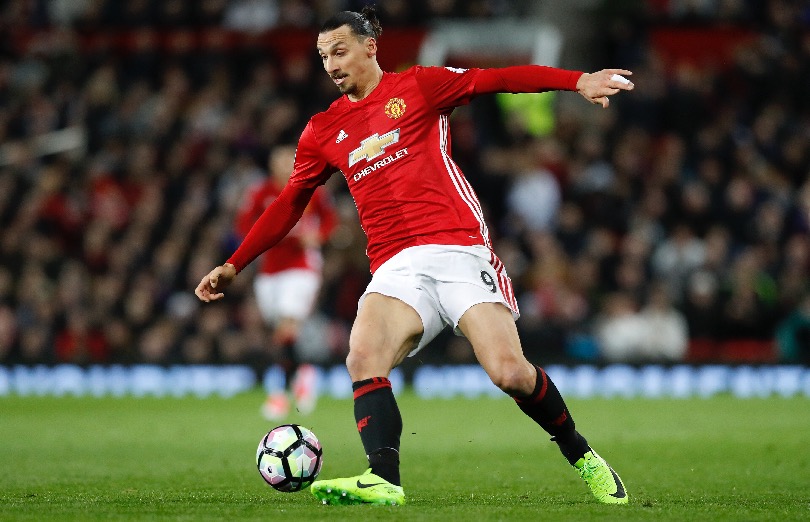
One of the reasons why life here is so opaque, is partly because of the Portuguese’s contrarianism in selection. His side struggled to cut through West Brom’s forest of centre-halves at the weekend and, in retaliation against an Everton team whose obdurate middle makes them mildly comparable, his teamsheet here was surely begging for incision.
The best features, fun and footballing quizzes, straight to your inbox every week.
But it lacked any such edge: Marcus Rashford and Jesse Lingard started in the wide areas and were initially lively, but United were troublingly static elsewhere. Henrikh Mkhitaryan and Paul Pogba, Mourinho’s most dynamic and creative players respectively, were left on the bench, with Marouane Fellaini charged with providing support to Zlatan Ibrahimovic, and Ander Herrera and Michael Carrick ordered to cut the lines with their passing.
Mourinho emphasised the importance of the first goal pre-game and yet picked a team which wasn’t really equipped to thunder forward. United, as is now their unwelcome default, were laboured and ineffective – an early Ibrahimovic chance aside – and it was Everton who played the more lively football.
It was also Everton who scored the game’s first goal, Phil Jagielka bending an ageing leg around a loose ball and flicking it beyond David de Gea from close range.
There was a time when going ahead at Old Trafford was an act of war; sometimes visiting sides would catch United on a sleepy day, but then sting them into action with an early goal. Not now. Daley Blind drew a good, reaching save from Joel Robles with a swirling free-kick and Ashley Young drove a dangerous low ball across the penalty box, but the response was largely meek and there was no real hint of that retaliatory ferocity.
“Who wants it?” bellowed a home fan from behind the dugout whenever United dallied. He had a point.
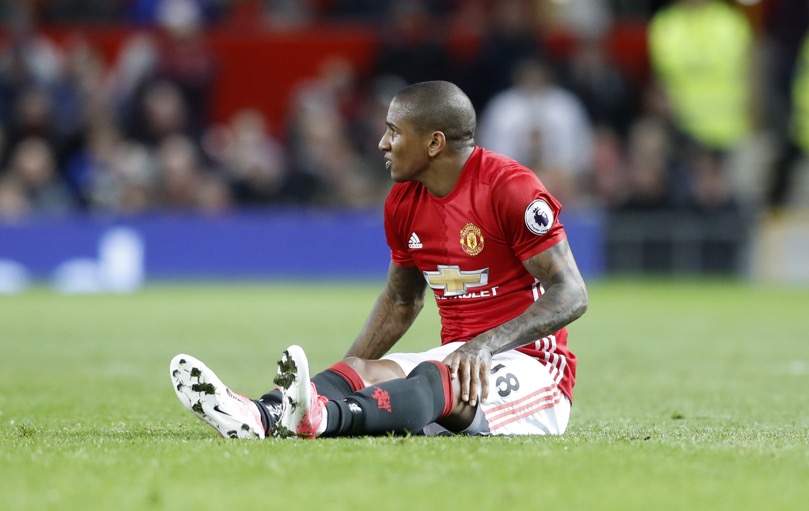
With the second half came Paul Pogba, subbed on to replace Daley Blind as Mourinho repurposed Herrera as first a left-, then a right-back. United didn’t necessarily improve, but the pace of the game quickened: a Pogba header shook the bar, and Old Trafford to life. Soon after, Mkhitaryan was introduced from the bench and, with Young injured, Luke Shaw followed him.
But if United’s theoretical threat grew, a real one took much, much longer to materialise. Conveniently, that second half supported the most common criticism they face: that their headliners act as a fig leaf for an ugly dysfunction. That's something which shows in the critical moments. When goals are needed and inspiration is sought, the same players are targeted; there’s no obvious belief in an encasing system and that’s likely why this team pursue games in such a chaotic way. Those final, frantic minutes against Everton may have eventually yielded an equaliser, but they were still predicated upon hope rather than expectation.
It was lottery ticket football. Crosses were played with eyes shut and passes were shovelled wide and towards the box in the hope that someone, eventually, would take responsibility. Really, we’re at Old Trafford and this is Manchester United?
A tactical contradiction
Post-game, Mourinho made a reasonable point. Though keen to re-emphasise that his unbeaten record remained intact, he talked of a collective confidence problem and how that informed his approach. When asked whether he favoured expression or tactical design in defeating the low blocks his side often encounter, he insisted that United’s fading belief made flair impossible and that the only route to goal was direct.
Logical, yes, but not an ailment expected of a team who haven’t lost any of their last 20 games. It's another slightly baffling contradiction.
Theirs is a squad which refuses to bind and which seems oddly resistant to the Mourinho mastic
United are improving, we’re told, and most statistics seem to imply that they are, but not in a way which feels particularly significant. No matter how distant that last loss becomes, theirs is a squad which refuses to bind and which seems oddly resistant to the Mourinho mastic. And there lies another curiosity: yes, United have their stars, but their civilians aren’t the useless bunch they’re often presented as; there shouldn't be such a stark line between their icons and their everymen. They're comprised of several exorbitantly talented players and a supporting cast of seasoned internationals. Water out of wine? No, not really.
Mourinho’s mantelpiece is busy with winners' medals from all over Europe – conclusive proof of his ability to blend all sorts of players together – yet this team’s individuals have retained their different densities. Why, what, how? With each passing game there are more questions without answers.
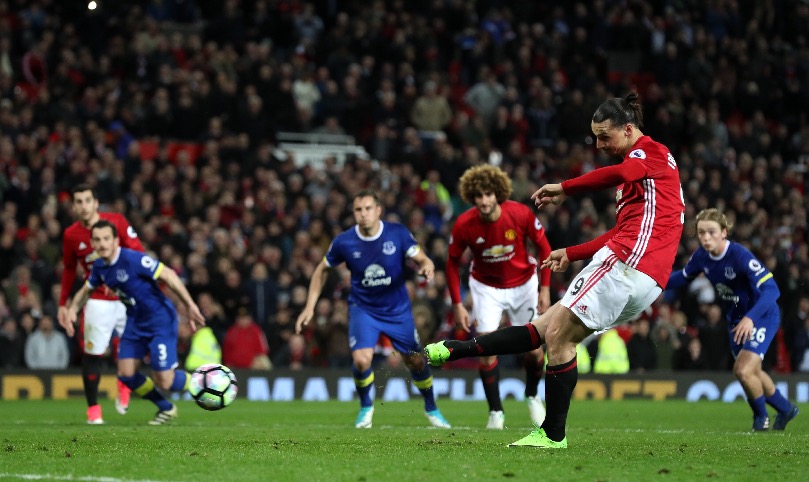
Ultimately, this fixture will be remembered for being not quite a disaster. Deep into stoppage time, a mishit Shaw volley was needlessly handled by Ashley Williams and, reliably, Ibrahimovic converted the resulting penalty with almost the last kick of the game. But even then, even in a moment of triumph, the roulette wheel nature of modern United-ball was exposed. It wasn’t a goal which arrived by design and neither was the penalty really earned; it was by-the-numbers play which relied on an appalling miscalculation.
So what is this team? Still, nobody can be quite sure. In one sense, they’ve evolved since Louis van Gaal’s departure, because Mourinho has quickened the pace and banished the sideways passing; there is at least the intent to attack now. Nevertheless, there remains something fundamentally wrong. The natives left Old Trafford relatively content - last-minute goals will do that - but will conclude on reflection that this was a point rescued from a situation they needn’t have been in at all. It was also a rescue partly enabled by players who should have been on from the start, and a final 10 minutes played with an intensity that should always have been there.
Really, it was only when United abandoned their planned approach (and Everton retreated from theirs) that they started to look vaguely threatening. Whatever that says, it’s not particularly flattering. And, whatever Manchester United are, it’s not particularly clear or even particularly impressive.
Seb Stafford-Bloor is a football writer at Tifo Football and member of the Football Writers' Association. He was formerly a regularly columnist for the FourFourTwo website, covering all aspects of the game, including tactical analysis, reaction pieces, longer-term trends and critiquing the increasingly shady business of football's financial side and authorities' decision-making.
